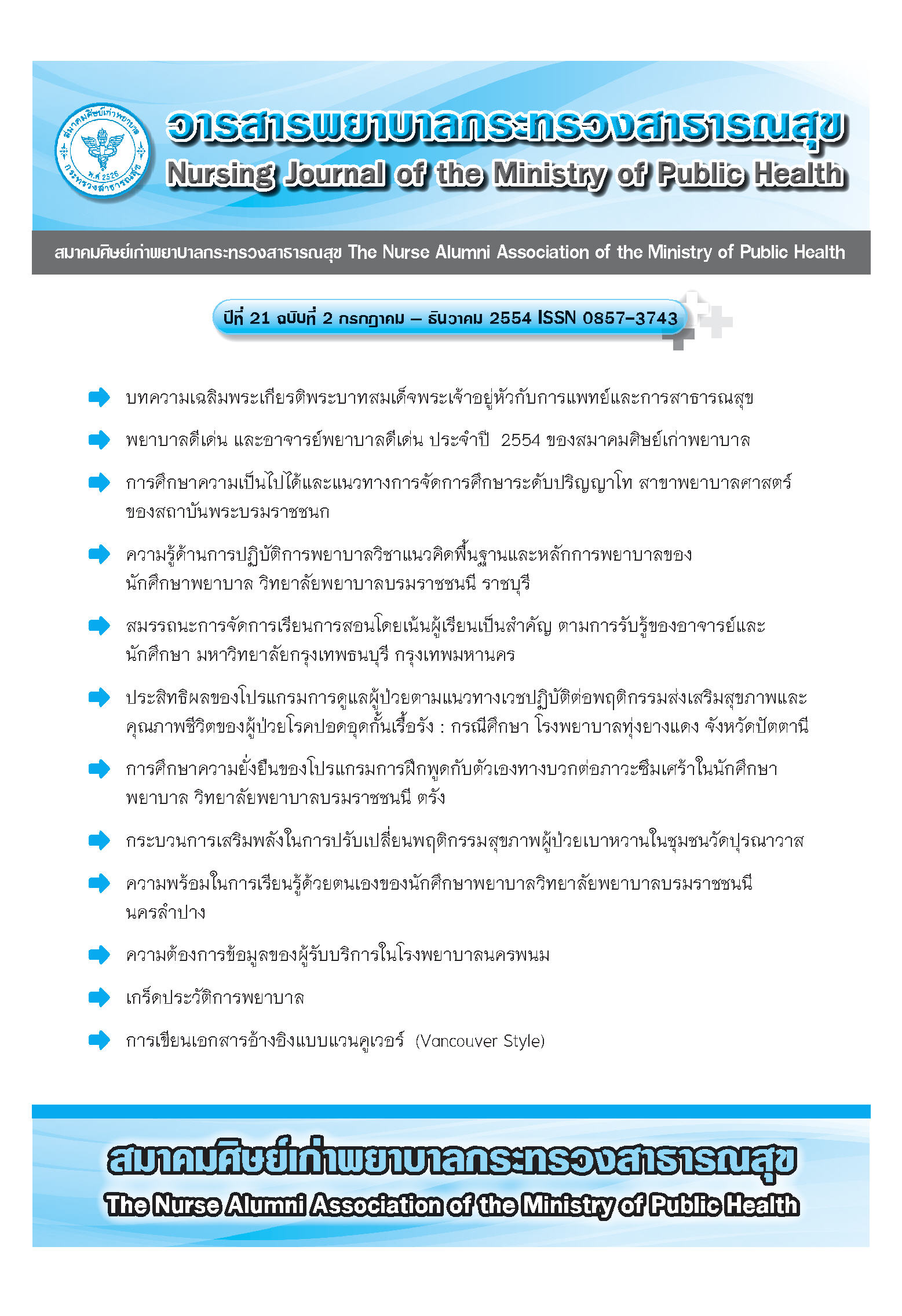ความยั่งยืนของโปรแกรมการฝึกพูดกับตัวเองทางบวก ต่อภาวะซึมเศร้าในนักศึกษาพยาบาลวิทยาลัยพยาบาลบรมราชชนนี ตรัง
Main Article Content
Abstract
บทคัดย่อ
นักศึกษาพยาบาลในโครงการผลิตพยาบาลวิชาชีพเพิ่ม เพื่อแก้ปัญหาการขาดแคลนพยาบาลในพื้นที่จังหวัดชายแดนภาคใต้ ส่วนใหญ่มาจากพื้นที่จังหวัดที่มีความไม่สงบ เป็นพื้นที่เสี่ยง ต้องเผชิญกับความรุนแรง และการสูญเสีย เช่น การลอบวางระเบิด และเหตุการณ์รุนแรง ที่บา งรายมีการสูญเสียชีวิตและทรัพย์สินของสมาชิกในครอบครัว เมื่อนักศึกษาเหล่านั้นมาศึกษาต่อในวิทยาลัยพยาบาล ก็ต้องปรับตัวอย่างมาก ต่อการเรียนการสอน และกฎระเบียบของวิทยาลัยฯ ยิ่งไปกว่านั้น ช่วงวัยรุ่นจะเป็นวัยที่มีความสับสนทางจิตใจมากกว่าวัยอื่น และต้องปรับตัวกับการเปลี่ยนผ่านจากวัยรุ่นไปสู่วัยผู้ใหญ่ ปัจจัยต่างๆ ดังกล่าวอาจทำให้นักศึกษากลุ่มนี้เกิดรูปแบบความคิดที่บิดเบือนและอาจนำไปสู่การเกิดภาวะซึมเศร้าได้
โปรแกรมการฝึกพูดกับตัวเองทางบวก เป็นโปรแกรมที่ประยุกต์ใช้เป็นทางเลือกเมื่อเกิดการรับรู้ที่บิดเบือนหรือเพื่อปรับระบบการคิด วัตถุประสงค์ของโปรแกรมนี้ คือ เพื่อใช้เป็นยุทธวิธีทางความคิดในการลดภาวะซึมเศร้า โดยศึกษาในกลุ่มตัวอย่าง จำนวน 30 คน ใช้วิธีการสุ่มแบบเฉพาะเจาะจง โดยสุ่มเข้ากลุ่มทดลอง 15 คน และกลุ่มควบคุม 15 คน มีการจับคู่ ตามระดับภาวะซึมเศร้า โดยกลุ่มทดลองจะได้รับการสอนและฝึกให้พูดกับตัวเองทางบวก ในขณะที่กลุ่มควบคุมให้ดำเนินชีวิตตามปกติ เครื่องมือที่ใช้ในการวิจัยประกอบด้วย 1) แบบบันทึกข้อมูลส่วนบุคคล 2) แบบประเมินภาวะซึมเศร้าของเบ็ค (Beck Depression Inventory IA [BDI-IA]) 3) โปรแกรมการพูดกับตัวเองทางบวกที่สร้างขึ้นโดย ขวัญจิต มหากิตติคุณ (2548) ตามแนวคิดของนีลสัน โจนส์ (Nelson-Jones, 1990) 4) แบบประเมินการพูดกับตัวเอง (Burnett Self-Talk Inventory [BSTI] ) ของเบอร์เนท (Burnett, 2004) แปลโดย ดาราวรรณ ต๊ะปินตา และขวัญจิต มหากิตติคุณ (2548) วิเคราะห์ข้อมูลโดยใช้สถิติเชิงพรรณนา สถิติทดสอบค่าทีชนิด 2 กลุ่มที่เป็นอิสระต่อกัน และชนิด 2 กลุ่มที่สัมพันธ์กัน ได้ผลการศึกษา ดังนี้ ค่าเฉลี่ยของคะแนนภาวะซึมเศร้าของนักศึกษาพยาบาลในกลุ่มทดลองและกลุ่มควบคุมก่อนเข้าร่วมโปรแกรมไม่แตกต่าง แต่หลังเข้าร่วมโปรแกรมกลุ่มทดลองมีค่าเฉลี่ยของคะแนนภาวะซึมเศร้าต่ำกว่ากลุ่มควบคุม (p <0.01) และนักศึกษาพยาบาลกลุ่มทดลองมีความยั่งยืนในการลคระดับภาวะซึมเศร้าภายหลังการเข้าร่วมโปรแกรมการพูดกับตัวเองทางบวก
คำสำคัญ: โปรแกรมการฝึกพูดกับตัวเองทางบวก, ภาวะซึมเศร้า, นักศึกษาพยาบาล
Abstract
Most students in the Registered-Nurse Production Project to resolve problems in the border provinces in the Southern Region of Thailand came from areas which were unsettled and were also areas of risk. They faced violence and loss were exposed to risks such as bombings. Some had lost lives and property of family members from violence. When the students came to study in the college of nursing, they have to adjust themselves for education and regulation. Moreover, the adolescents were also dealing with their own mental and human development more than older students. The transition from adolescence to adulthood might lead to distorted thinking and depression.
The Positive Self-Talk Training Program (PSTP) was successfully applied to alliterate maladaptive perceptions or cognitive systems. The objective of the program was used to reduce the symptoms of depression. A quasi-experimental research design (pre-post tested) was conducted in the Boromarajajonani Nursing College, Trang. Thirty depressed nursing students were enrolled and randomly separated into two groups: experimental group (n=15) and control group (n=15). The groups were matched for sex, age and level of depression (mild to moderate). The experimental group was trained in and rehearsed positive self-talk and assessed by using the followings instruments: 1) demographic data form; 2) Beck Depression Inventory IA (BDI-IA); 3) Positive Self-Talk Training Program on Depression among adolescents was developed by Kunjit Mahakittikul under Nelson-Jones conceptual framework (Nelson-Jones, 1990)and 4) The Burnett Self-Talk Inventory (BSTI). The control group received treatment as usual. Data was analyzed using descriptive statistics, a paired t-test and independent t-test.
The results indicated that the PSTP was significantly effective for reducing depression among nursing students (p <0.01). Specifically, we found that the depression post-test mean score of the experimental group was significantly lower than that of the control group (p <0.01). Future studies should be designed to conduct a longitudinal study or time series study to maintain students’ behaviors because these students gained a lot of positive self-talk to change their cognitive behaviors.
Key words: positive self-talk training program, depression
Article Details
บทความและรายงานวิจัยในวารสารพยาบาลกระทรวงสาธารณสุข เป็นความคิดเห็นของ ผู้เขียน มิใช่ของคณะผู้จัดทำ และมิใช่ความรับผิดชอบของสมาคมศิษย์เก่าพยาบาลกระทรวงสาธารณสุข ซึ่งสามารถนำไปอ้างอิงได้
